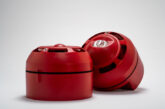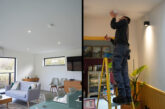
In this regular column, Dr. Tom Brookes, MD at Zzeus Training and chairman of the FSA, answers your questions related to fire safety. In this month’s edition he looks at BS 5839-1 and whether it is safe to have just heat detectors fitted in hotel bedrooms.
The current rules in BS 5839-1 for a Category L2 fire detection and alarm system in hotels state that you may use a heat detector in hotel rooms that open onto escape routes and smoke detectors in the escape routes and corridors.
One of my customers (a risk assessor) has been told that because the Fire Safety Order requires that all relevant persons are adequately protected, the current heat detectors in bedrooms are incorrect and that smoke detection must be fitted in all hotel bedrooms.
Is this correct?
This answer has two parts, so I’ll answer the first question here: is it acceptable to install heat detectors in hotel bedrooms?
Using smoke detectors, which detect small particles, in hotel bedrooms is likely to increase false alarms. These could be triggered by steam from bathrooms and kettles, aerosol sprays, cigarette smoke, and other items guests might use.
More false alarms could lead to people mistrusting the fire alarm system, which might cause delays in responding to real alarms and lower fire safety standards.
Heat detectors in hotel bedrooms offer some protection for guests when a fire starts. They alert hotel occupants well before a fire threatens any escape routes.
Fire statistics show that the chance of a fire starting in a hotel bedroom is very low (about one bedroom fire per million guest nights each year). There are almost no deaths in the room where the fire starts, no matter what type of detector is used in the bedroom.
We who sit on the BSI committee responsible for BS 5839-1 have not received any evidence that the current recommendations for hotels need to be changed.
BS 5839-1 guidance on using heat detectors in hotel bedrooms was confirmed by a specific decision from the government department in England and Wales (Chief Fire and Rescue Adviser).
This decision, called a “Determination in respect of the fire safety adequacy of fire detection in a hotel,” supported the use of heat detectors in a particular hotel’s bedrooms.
A link to the government determination is included here, should you need to justify to a risk assessor who may not be fully conversant with fire alarm categories: www.gov.uk/guidance/determinations-under-the-fire-safety-order-determination-about-adequacy-of-fire-detection-in-a-hotel
That said, specifying what category a fire system should be is often the fire risk assessor’s job.
So, playing devil’s advocate slightly, pretend this hotel specialised in individuals with movement issues or disabilities, or maybe was used as a respite speciality hotel where loved ones can go to a hotel that gives their partners a rest from the day-to-day care of the person with the issue.
With the majority of occupants likely to be elderly as well, most fire risk assessors would look at increasing the level of early detection to an L1 Category because the occupants may be unable to evacuate quickly in the event of a fire.
Do you have a question you’d like answered? Email your queries to: Tom@zzeus.org.uk
Get more details about Zzeus Training and the range of course on offer here
Catch up on more ‘Dr Zzeus Q&A’ articles here








